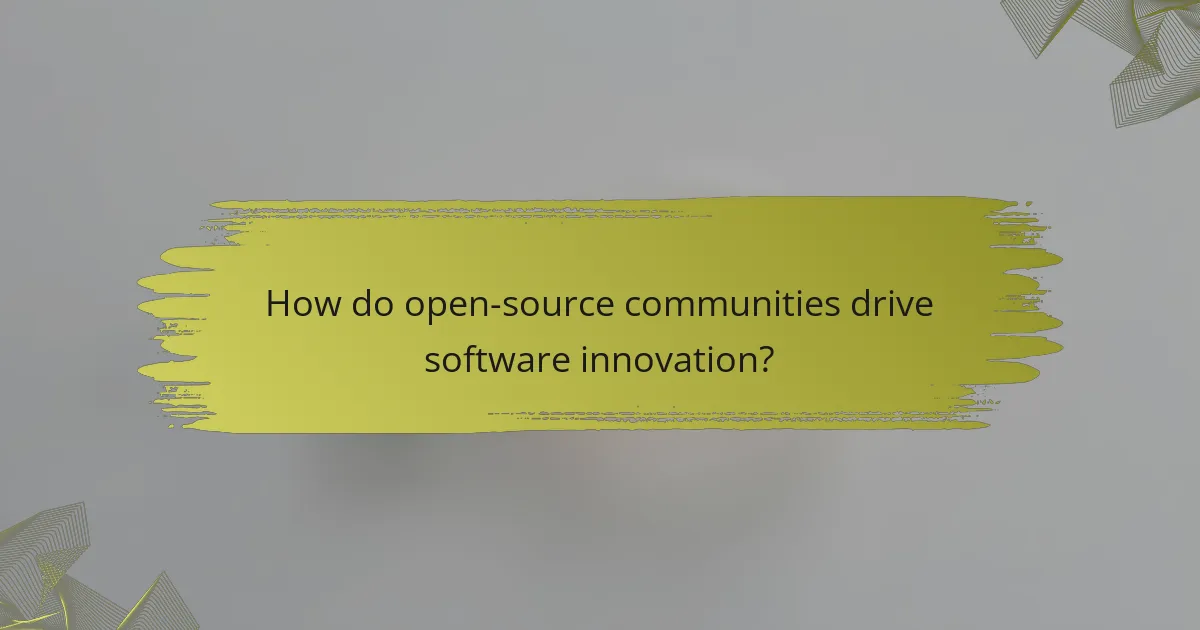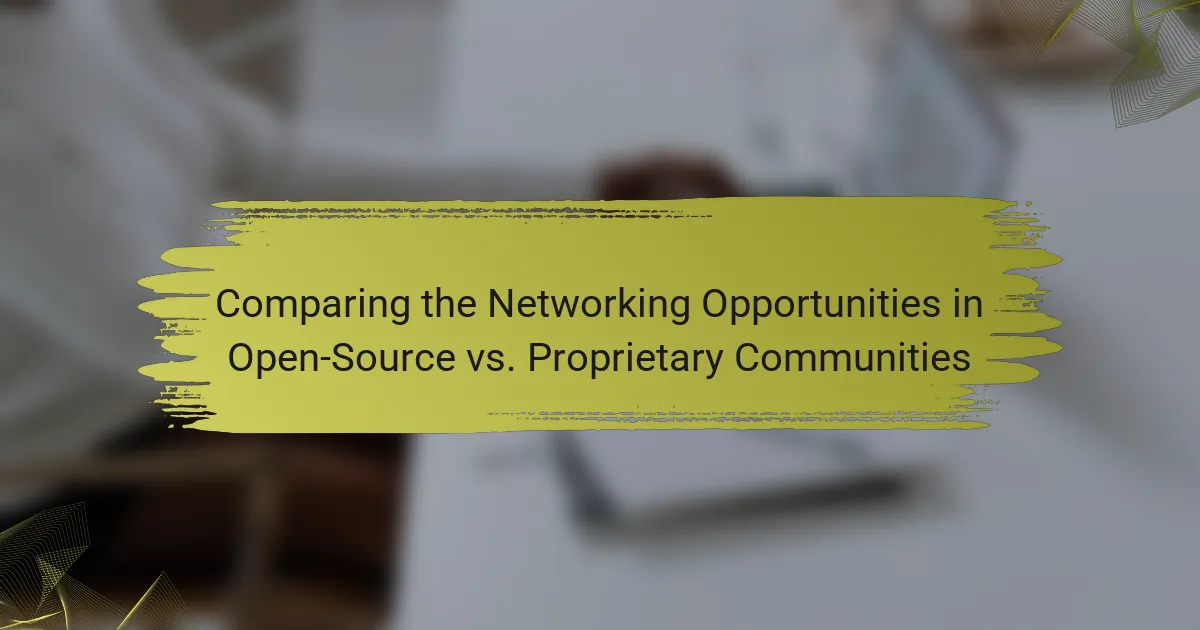Open-source communities play a crucial role in driving innovation in software development by facilitating collaboration among developers. This environment encourages the sharing of resources and knowledge, leading to faster development cycles and inventive solutions to complex challenges.

How do open-source communities drive software innovation?
Open-source communities foster software innovation by enabling collaborative efforts among developers, allowing for shared resources and knowledge. This collective approach accelerates the development process and encourages creative solutions to complex problems.
Collaborative coding practices
Collaborative coding practices are fundamental to open-source communities, where developers work together on shared projects. This collaboration often occurs through platforms like GitHub, where contributors can submit code, review changes, and discuss improvements.
By leveraging version control systems, teams can track modifications and revert to previous versions if necessary. This transparency not only enhances code quality but also encourages a culture of learning and mentorship among participants.
Rapid prototyping and iteration
Rapid prototyping and iteration are key advantages of open-source development. Communities can quickly create prototypes to test ideas and gather feedback, allowing for swift adjustments based on user input. This iterative process helps refine features and improve usability.
For instance, a new software tool might undergo several iterations within weeks, incorporating user suggestions and fixing bugs in real-time. This agility contrasts with traditional development cycles, which can take months or years to complete.
Global talent pool engagement
Open-source communities tap into a global talent pool, bringing together diverse skills and perspectives. Developers from different backgrounds contribute unique insights, which can lead to innovative solutions that may not emerge in isolated environments.
Engaging with this international network also allows for the sharing of best practices and technologies across borders. For example, a developer in Europe might collaborate with a team in Asia to enhance a project, benefiting from various cultural approaches to problem-solving.

What are the key benefits of open-source collaboration?
Open-source collaboration offers significant advantages, including reduced costs, improved security, and a wealth of diverse perspectives. These benefits stem from the collective effort of developers and users who contribute to and refine software projects.
Cost-effective development
Open-source projects typically have lower development costs compared to proprietary software. Since the source code is freely available, organizations can avoid hefty licensing fees and instead allocate resources towards customization and support.
Additionally, many open-source tools and platforms are built on community contributions, which can lead to faster development cycles. Companies can leverage existing solutions rather than starting from scratch, resulting in significant savings.
Enhanced security through transparency
Transparency in open-source software allows for rigorous scrutiny by the community, which can lead to improved security. With many eyes on the code, vulnerabilities are often identified and addressed more quickly than in closed-source alternatives.
Moreover, organizations can conduct their own security audits on open-source software, ensuring that it meets their specific security standards. This proactive approach can help mitigate risks associated with software vulnerabilities.
Access to diverse perspectives
Open-source communities bring together individuals from various backgrounds, leading to a rich exchange of ideas and solutions. This diversity fosters innovation, as contributors can approach problems from different angles and share unique insights.
By engaging with a global community, organizations can tap into a broader range of expertise and experiences. This can enhance the quality of software development and lead to more robust and versatile solutions that cater to a wider audience.

Which platforms support open-source projects?
Several platforms are designed to support open-source projects, providing tools for collaboration, code management, and project hosting. The most prominent among these are GitHub, GitLab, and SourceForge, each offering unique features that cater to different aspects of software development.
GitHub as a collaboration hub
GitHub is widely recognized as the leading platform for open-source collaboration, hosting millions of repositories. It enables developers to share code, track changes, and manage projects through features like pull requests, issues, and discussions.
To effectively utilize GitHub, consider creating clear documentation for your project and engaging with contributors through regular updates. This fosters a welcoming environment that encourages collaboration and innovation.
GitLab for CI/CD integration
GitLab stands out for its built-in Continuous Integration and Continuous Deployment (CI/CD) capabilities, making it a powerful tool for automating software development workflows. This integration allows teams to streamline testing and deployment processes directly within the platform.
When using GitLab, take advantage of its pipelines feature to automate tasks like testing and deployment. This can significantly reduce the time from development to production, enhancing overall project efficiency.
SourceForge for project hosting
SourceForge is one of the original platforms for hosting open-source projects, providing a space for developers to share their work and collaborate. It offers tools for version control, bug tracking, and project management, catering to a wide range of software projects.
While SourceForge may not have the same level of community engagement as GitHub or GitLab, it remains a viable option for hosting projects. Ensure your project is well-documented and actively maintained to attract contributors and users.

How can businesses leverage open-source communities?
Businesses can leverage open-source communities by actively participating in collaborative projects, which can lead to innovative solutions and enhanced brand reputation. Engaging with these communities allows companies to access a wealth of knowledge, resources, and feedback that can drive product development and improvement.
Building brand loyalty through contributions
Contributing to open-source projects can significantly enhance brand loyalty among users and developers. When businesses invest time and resources into these communities, they demonstrate commitment to transparency and collaboration, which resonates well with tech-savvy audiences.
For example, companies like Red Hat and Mozilla have built strong reputations by contributing to open-source software, fostering a loyal user base that appreciates their dedication. This loyalty can translate into increased customer retention and advocacy.
Utilizing community feedback for product improvement
Open-source communities provide a platform for businesses to gather valuable feedback on their products. By engaging with users directly, companies can identify pain points and areas for enhancement, leading to more user-centered development.
For instance, businesses can create forums or GitHub repositories where community members can report bugs, suggest features, or share their experiences. This iterative feedback loop can significantly accelerate product refinement and innovation, ensuring that offerings align closely with user needs.

What are the challenges of open-source development?
Open-source development faces several challenges, including project sustainability and managing contributor engagement. These factors are crucial for maintaining a vibrant community and ensuring ongoing innovation.
Maintaining project sustainability
Project sustainability in open-source development refers to the ability to keep a project active and relevant over time. This often requires a consistent influx of contributors, funding, and resources to support ongoing development and maintenance.
To enhance sustainability, project leaders should establish clear goals and a roadmap, encouraging contributors to align their efforts with the project’s vision. Additionally, seeking sponsorship or donations can provide financial support, allowing for more robust development and infrastructure.
Managing contributor engagement
Effective management of contributor engagement is vital for the success of open-source projects. Engaged contributors are more likely to contribute code, report issues, and help with documentation, which can significantly enhance the project’s quality and reach.
To foster engagement, project maintainers should create an inclusive environment that welcomes new contributors. This can include providing clear contribution guidelines, recognizing contributions publicly, and offering mentorship to help newcomers navigate the project. Regular communication through forums or chat platforms can also keep contributors informed and motivated.

How do open-source communities impact software quality?
Open-source communities significantly enhance software quality through collaborative development, peer review, and rapid iteration. By allowing diverse contributors to inspect and improve code, these communities foster a culture of accountability and innovation.
Collaboration and Peer Review
Collaboration in open-source communities enables developers from various backgrounds to work together, sharing knowledge and skills. Peer review processes allow for multiple eyes on the code, which helps identify bugs and improve functionality before software is released.
This collective scrutiny often leads to higher quality software, as contributors can spot issues that a single developer might overlook. For instance, projects like Linux and Apache benefit from thousands of contributors, resulting in robust and reliable software.
Rapid Iteration and Feedback
Open-source projects typically embrace rapid iteration, allowing for quick updates and improvements based on user feedback. This agile approach means that software can evolve rapidly to meet user needs and fix vulnerabilities.
For example, projects like WordPress frequently release updates that address security issues and enhance features, often within days of identifying a problem. This responsiveness is a hallmark of effective open-source development.
Community Standards and Best Practices
Open-source communities often establish their own standards and best practices, which guide developers in writing high-quality code. These guidelines can cover everything from coding styles to documentation practices, ensuring consistency across projects.
Adhering to these community standards not only improves the quality of the software but also makes it easier for new contributors to engage with the project. For instance, projects like Mozilla have comprehensive guidelines that help maintain high-quality contributions.



